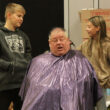Sean C. Morgan
The Oregon Department of Forestry and Keep Oregon Green are urging people to be careful using campfires, which is this week’s fire prevention focus during Wildfire Awareness Month.
Campfires play a large role during fire season around Sweet Home, said Neil Miller, ODF Sweet Home Unit forest protection supervisor, although the roadside camping ban in the Quartzville Corridor along Green Peter Reservoir may change that.
Fire officials constantly have to put out abandoned campfires, Miller said.
If officials catch someone with an improper campfire, they will warn the person once, Miller said. If the person has been warned in the previous 36 months, he or she will receive a citation, which carries a fine of $110.
Escaped campfires are costly, Miller said. The ODF spent more than $160,000 in 2013 to suppress unattended and escaped campfires. If a campfire escapes and spreads out of control, the person who started the fire is responsible for the cost of suppression.
Locally, fire officials have not had to deal with any large escaped campfires, Miller said.
Outside of the Quartzville Corridor, fire officials mostly respond to reports around Foster Reservoir and dispersed throughout the county, Miller said. Most local residents are aware and careful, he said. Mostly, fire officials cope with visitors from outside the area when it comes to campfires.
The ban on camping along the Quartzville Corridor will probably limit ODF’s issues with campfires and make it safer up there, Miller said. “It’s always made some local landowners nervous too.”
The biggest question right now is where those campers will end up going, Miller said. The plan is to increase the size of Whitcomb Creek Campground, but it hasn’t been done yet.
It may also push campers further upstream, above Green Peter, onto Bureau of Land Management and Forest Service lands, he said.
To help spread the word about campfire safety, Miller has been visiting area first-grade classrooms in Sweet Home, Lebanon and Albany with Smokey Bear to talk to provide a fire prevention message and share campfire safety tips.
His main goal is to make people aware they need to keep campfires small, stay with them at all times, clear a 5-foot radius around the campfire and make sure it’s completely cold before leaving, Miller said. People should check with local fire officials if they have any questions.
The Sweet Home Unit may be reached at (541) 367-6108.
Campfires are allowed in general until regulated use begins. The burn ban will take effect on June 15 or June 16. Fire season typically begins the first of July, followed a week or two later by regulated use, which limits campfires to designated campgrounds.
The outlook for fire season continues to be higher-than-usual temperatures and lower-than-normal precipitation, Miller said.
The ODF and Keep Oregon Green recommend the following tips:
n Call local forestry and fire officials before you go into the woods to learn if there are any current campfire restrictions.
n Select the right spot. Maintained campgrounds with established fire pits are the safest venues for campfires. Outside of campgrounds, avoid areas near your tent, structures, vehicles, shrubs and trees. Be aware of low-hanging branches overhead. The site should be cleared to 5 feet on all sides of the campfire.
n Keep the campfire small. A campfire is less likely to escape control if it is kept small. A large fire may cast hot embers long distances. Add firewood in small amounts as existing material is burned.
n Attend your campfire at all times. A campfire left unattended for only a few minutes can grow into a costly, damaging wildfire. State law requires you to stay with your campfire from start to finish, until it is dead, to ensure that any escaped sparks or embers can be extinguished quickly.
n Never use gasoline or other accelerants.
n Don’t start a campfire when it is windy.
n Always have water and fire tools on site. Have a shovel and a bucket of water nearby to extinguish any escaped embers. When you are ready to leave, drown all embers with water, stir the coals and drown again. Repeat until the fire is dead out.
n Make sure your fire is out. Completely extinguish it before leaving. If it is too hot to touch, it is too hot to leave. A campfire that appears to be extinguished can harbor heat for weeks. Then a warm day with a little wind can rekindle the sleeper fire into flames.
n Burn only wood. State regulations prohibit the burning of any material that creates dense, toxic smoke or noxious odors.
n Remember that the person responsible for a campfire that escapes is responsible to pay suppression costs.
For more information, visit keeporegongreen.org.
Inside the Sweet Home city limits, residents are allowed to have recreational fires in a fire pit as long as it is not a threat to public safety, said City Manager Craig Martin. The city also allows backyard burning when outdoor burning is allowed elsewhere, Martin said.
Every year, city officials receives complaints about neighbors who have campfires in their backyards, he said.
This time of year, he said, the city is focused mainly on tall weeds and grass. After several notifications, the city will mow property with tall weeds and grass, typically vacant or abandoned, at the owner’s expense. The premise of the ordinance is to protect life and property.




